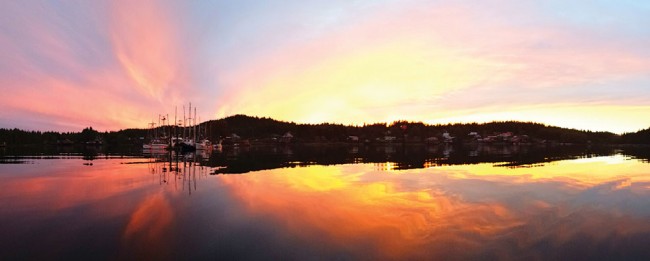
Photo Credit: Friends of Digby Island
Digby Disturbed
In the wake of the Canadian government’s approval in September of Pacific NorthWest’s LNG export terminal on Lelu Island, nearby residents are watching the progress of another liquefied natural gas facility through federal and provincial regulatory processes with anxiety, weariness and apprehension. “We’re coping and hoping,” says Sarah Chi Brown, a long-term resident of Digby Island, a low-lying landmass west of Prince Rupert that currently hosts the local airport and two small communities of Dodge Cove and Crippen Cove.
Digby’s southeast end is also the proposed site of Aurora LNG, one of a seeming multitude of LNG terminals slated for the area. This proposal has been cause for deep concern for Brown and her fellow Dodge Cove inhabitants ever since it was announced by Nexen Energy, a wholly owned subsidiary of CNOOC Ltd. (Chinese National Offshore Oil Corporation), in November 2014.
Aurora LNG’s proposal includes storage tanks, trains for moving gas, flare stacks, two sea berths for tankers, two power plants and two fenced in construction camps housing thousands of workers. An offloading facility would be constructed in nearby Casey Cove. It could consume up to 400 ha of Crown land on Digby Island, coming within 500 metres of many residents’ property lines. The way those who call Dodge Cove home see it, Aurora LNG will consume their way of life as well.
Small community
Dodge Cove is one of BC’s smallest unincorporated communities with about 30 full-time residents and can only be reached by boat from nearby Prince Rupert. Affectionately called “the cove” or just “Dodge” by those who know it and love it, this tiny coastal hamlet with its single, barely-one-kilometre long carless road has a history of fishing, lumber milling and boatbuilding that goes back more than 100 years.
“It’s the kind of place that attracts independent people living common-sense lives, doing things for themselves,” says Brown, whose husband runs a boat yard and six-year-old daughter is the cove’s youngest inhabitant.
“People here really value being off the beaten track,” adds Lou Allison, another long-time occupant.
Those who live here are artists, activists, boat-builders, carpenters, fishers and more. Nowadays, however, Allison, Brown and many other residents are compelled to take up the stressful, unfamiliar job of parsing detailed scientific specifications and regulatory legalese, all while facing the implacable juggernaut of a foreign-owned corporation, its seemingly unlimited resources and a provincial government desperate to realize its promise of a viable LNG export industry.
“The first time the company came to speak to us, they mentioned that this project represents $40 billion,” Allison says. “I looked around the room; there were barely 40 people there.” In other words, the math is not in Dodge Cove’s favour.
Despite the pervasive sense that approvals for projects like Aurora are rubber stamped no matter the input, residents have not held back from making their voices heard. A secret-ballot vote was taken soon after the project was announced, with 96 percent voting against an LNG terminal on Digby Island. A website and Facebook group called Friends of Digby Island have been created to share information about the project in particular and LNG industry in general. The community also fought to have representation on the working group that created the terms of reference for its environmental assessment application.
“It’s been a steep educational curve,” Allison says about the mounds of documents they’ve waded through. “It might be an exercise in futility but if it goes through I don’t want to feel I should have done more.”
Big concerns
There is much that worries Dodge Covers about Aurora, including the safety of having an LNG facility so close to a residential area, but one issue Allison and others have repeatedly raised with the BC government is that Aurora’s proposed footprint overlaps the Dodge Cove Official Community Plan boundary. They are also worried about the project’s proximity to the small lake and watershed that provide drinking water.
Over the summer, the North Coast Regional District (formerly the Skeena-Queen Charlotte Regional District) sent a letter on behalf of Dodge Cove to the minister of Forests, Lands and Natural Resource Operations protesting the OCP not being respected by Nexen during the project’s exploratory phase. The government’s response, says Des Nobels, vice chair and director on the NCRD board and longstanding Dodge Cove resident, was that “cutting down trees and drilling core samples do not count as activity on the land.”
Residents are also concerned about air quality. Just a couple days after PNW LNG’s approval, the BC government quietly posted the Prince Rupert Airshed Study, an “independent assessment” commissioned by the province to help inform future industrial development. Since its release late September, the study has garnered only a few articles parroting the government’s press statement that the area can safely accommodate increases in industrial expansion.
Despite these assurances, former Northern Health chief medical officer David Bowering is troubled by several aspects of the study. He suggests the report is flawed because the computer model used doesn’t take into account potential effects of climate change on local weather patterns, nor does it show how the pollutants—particulate matter, sulphur dioxide and nitrogen oxides—will interact with each other.
“It’s potentially 90 tonnes a day (of emissions),” he says, “but all they acknowledge are the short-term effects of irritants, sore throat, maybe some slight asthma.”
He points out that long-term effects that might develop from these minor issues are hard to study and take a long time to prove: “I can promise you that the limits allowed will be much lower in 20 years.” Dodge Cove is consistently notable for its proximity to potential peak concentrations of the pollutants, as well as for elevated levels of the irritants measured in the study. It’s a dubious honour.
“I would not be reassured by anything in that study,” Bowering says, calling it a “political document” rather than transparent, peer-reviewed science.
Outta Dodge
The single undeniable fact about Aurora LNG is that life in Dodge Cove will be affected in almost every way.
“The reasons that people choose to live here are all going to be destroyed,” Brown says: peace, quiet and closeness to nature. The cove is already faced with increasing amounts of light and sound pollution from the steadily escalating activity at the Fairview Container Terminal just across the harbour to the south; there is little doubt that Aurora would add its own sodium glow to the night sky. Low scrubby trees and relatively flat topography mean that, despite a 500-metre wide “buffer” between property lines and project perimeter, this massive industrial development would create a jarring visual scar on a currently untouched vista of wetlands, forest and ocean. It would physically cut off access to beaches, lakes and trails used by residents and tourists alike.
Although final approvals and investment decisions are years away, Aurora’s negative impact is already being felt. Allison compares Dodge’s situation to the Greek legend of the sword of Damocles, in which a king seats an overly enthusiastic commentator under a giant sword suspended by a single hair in order to illustrate the precariousness of his situation. Community cohesion has been one of the first victims of this project, as people attempt to withdraw from an incredibly stressful situation they feel they have no control over, especially after PNW’s approval.
“People don’t come together socially as much as they used to, because talk inevitably turns to LNG and people are exhausted by it,” Nobels says. “People are already talking about leaving, which doesn’t bode well for new people coming here.”
Indeed, Brown is steeling herself for what she thinks could be one of her family’s last Christmases in Dodge Cove: “I can’t imagine raising a kid beside what they’re proposing,” she says. “How do you mitigate the destruction of my way of life?”
Nexen Energy did not reply to multiple interview requests for this article. The comment period on Aurora LNG’s environmental assessment certificate is expected to be announced late December.







We must not let LNG into the Pacific North West.
👤 Roy Henry Vickers 🕔 Dec 02, 2016
A beautifully written article, and unfortunately very true. There is no substitute for a community like Dodge Cove.
👤 Max Ritts 🕔 Jan 21, 2017